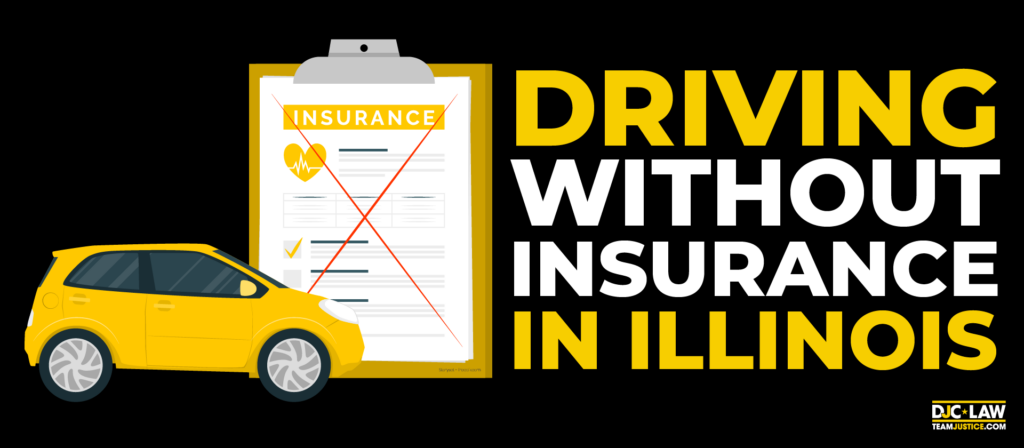
Driving without insurance in Illinois – or any state – is never a good idea. Like holding a valid Illinois driver’s license, you must have a minimum amount of insurance to get behind the wheel.
ailure to comply can result in financial penalties, license suspension, and even the suspension of your vehicle’s registration. However, you may be surprised to learn that an estimated 16.3% of drivers in the Prairie State are driving without sufficient insurance, according to a study by the Insurance Information Institute.
In today’s guide, we’re going to discuss what happens if you begin driving without insurance in Illinois and your options if you’re involved in an accident with an uninsured driver.
Key Takeaways
- Driving without the minimum coverage is always illegal in Illinois.
- Failure to have a valid car insurance policy can result in fines, driver’s license suspension, vehicle registration suspension, and SB-22 insurance requirements under court supervision.
- Minimum fines begin at $500 for first and second offenses, with the minimum rising to $1,000 if convicted three or more times.
- A court may require you to take out SB-22 auto insurance, which is reserved for high-risk drivers, to reinstate your license.
- Getting caught in an accident without car insurance could lead to a Class A misdemeanor charge if you’re found to have caused bodily injury, which could carry up to 364 days of mandatory jail time.
- If you’re involved in a collision with an uninsured driver, you can claim through your insurer’s uninsured motorist coverage or file a civil lawsuit through a car accident attorney.
Is Driving Without Insurance Illegal in Illinois?
Driving without insurance is illegal if you operate a motor vehicle on Illinois roads. With the average full-coverage car insurance policy now costing $1,541 per year (MarketWatch, 2024), it may be tempting to drive without insurance. After all, what are the chances of actually getting caught, right?
The truth is that law enforcement statewide is cracking down on uninsured and unlicensed drivers. It’s a proven fact that uninsured drivers are more accident-prone and have a higher chance of fleeing the scene if they’re involved in an accident.
Regardless of whether you’re a great driver or you follow the rules of the road and have never been in an accident, you must carry adequate insurance coverage.
What are the Penalties for Driving Without Valid Insurance?
Driving without valid insurance invites a range of penalties, including fines, vehicle registration suspension, and license suspension.
However, the types of penalties applied to you depend on your situation, such as whether you were involved in an accident and whether you’re classified as a repeat offender. The point is that penalties can climb significantly, and you could be unable to drive at all.
The problem is that most of these penalties also come with a mandatory court appearance. Depending on whether you subsequently prove you’ve obtained car insurance, you may be able to escape with a ticket, but again, it depends on how many times you’ve been caught.
How Much is a Ticket for No Insurance in Illinois?
The cost of driving with no insurance in Illinois depends on how often you have been convicted of the offense. First or second offenses come with a minimum mandatory fine of $500, with a maximum fine of $1,000. Three or more convictions come with a $1,000 minimum fine.
However, this isn’t where your costs stop. Even if this is your first offense, your driving license and vehicle registration could be suspended for up to three months. You will also be required to pay a $100 reinstatement fee and provide proof of insurance.
If your driver’s license is suspended, you cannot legally operate your vehicle. If your vehicle registration is suspended, nobody can operate the car. Naturally, being unable to drive increases your costs because you’ll have to rely on public transport, cabs, or a family member or friend to get around.
Can You Go to Jail in Illinois for No Insurance?
Driving without insurance in Illinois is classified as a petty offense, meaning no matter how many times you get caught, there is no possibility of jail time. Every state has its own rules on whether driving without insurance carries jail time, with some states being stricter than others.
For example, although there’s no jail time in Illinois for driving without insurance, Connecticut can imprison you for driving uninsured motorists for up to five years. However, most states don’t provide jail time for getting caught driving without insurance.
What Happens if You Get a No-Insurance Ticket in Illinois?
Illinois law 625 ILCS 5/3-707 states that every driver must carry a minimum amount of vehicle liability insurance. Getting ticketed for driving without insurance means you are almost certainly going to have to appear in court to resolve the situation. This will lead to fines, license suspensions, and extra court costs.
But what does the process look like?
Electronic Liability Insurance Verification System (ILIVS)
Catching uninsured drivers in Illinois usually meant getting pulled over as part of a routine traffic stop or being involved in an accident. In short, as long as you avoided contact with law enforcement agencies, there was no way to determine whether you were insured.
In 2020, the Illinois Secretary of State introduced the Electronic Liability Insurance Verification System (ILIVS). The ILIVS system is a statewide database that verifies the insurance status of every registered vehicle in Illinois. Using advanced technology, law enforcement and government agencies can quickly discover whether a driver is insured.
Twice a year, the system cross-checks every registered vehicle and insurance records. If a vehicle is found to have no valid insurance, the registered owner receives a letter asking them to verify their coverage. If they fail to do so, they may see their driving privileges immediately suspended.
Implementing this automatic system means that even if you never come into contact with the authorities, your lack of insurance could still be detected.
Getting Caught Driving Without Insurance
Driving without insurance means you’ll be charged with a petty offense. Despite the benign name, it comes with serious consequences.
Here’s what that looks like:
- Minimum mandatory $500 fine.
- Court costs.
- $100 reinstatement fee.
- Three-month license suspension.
If you continue to drive without insurance while already suspended for driving without insurance, courts have the right to impose an extra six-month license suspension.
However, the penalties continue to climb with a third or subsequent conviction. The minimum mandatory fine increases to $1,000 plus court costs. Additionally, your suspension could apply to the vehicle and your driving license.
Note that in some cases, an officer has the right to impound your vehicle, but this depends on the circumstances.
Late Compliance Insurance
Acquiring an auto insurance policy after receiving your ticket is not a method for getting out of the consequences of driving without insurance. At no stage has an Illinois court ever considered this a valid defense, but it’s a requirement to get your vehicle back on the road.
In some cases, showing proof of insurance on the day of your court appearance may enable you to avoid getting your license suspended. This typically only works if this is your first offense. If the court agrees to offer court supervision, you may get away with a $100 fine plus any court costs.
Electronic Proof of Insurance
Illinois allows you to carry physical proof of auto insurance through your insurance card or a digital insurance card on a smartphone or tablet.
We recommend carrying a physical insurance card because you could still be ticketed if you have trouble accessing your proof of insurance. Even if you have insurance, an officer can still write you a ticket requiring you to appear in court to prove that you had a valid insurance policy at the time.
If this happens, you can avoid the consequences of being caught without car insurance, but you may still be required to pay court costs.
What is the SR-22 Requirement in Illinois?
An SR-22 or Certificate of Financial Responsibility (CFR) is a special type of insurance certificate designed for high-risk drivers. It verifies that drivers in this category are carrying valid state-approved insurance. The Office of the Secretary of State implemented this policy to make it harder for these types of drivers to drive without insurance.
If you’re convicted of driving without car insurance three or more times, a court may require you to take out SR-22 insurance. Failure to meet the terms of your SR-22 within 90 days means your license is automatically suspended until you purchase and prove that you have valid insurance.
SR-22 policies range from one to five years, depending on how significant your violation is. Unfortunately, this type of insurance isn’t the cheapest because you’re considered a high-risk driver, meaning you can expect your costs to be higher than other drivers.
What Happens if You Get in an Accident Without Insurance?
Getting into an accident without car insurance coverage represents a massive problem because you could be charged with a Class A misdemeanor if any bodily harm occurs. Exactly what happens if you’re involved in an accident largely depends on the circumstances.
For example, if you’re involved in a simple fender bender with no injuries, you’ll be given the same penalties for getting caught driving without insurance. On the other hand, you don’t have the liability protection provided by an insurer, meaning the other driver could file a civil lawsuit against you. Unfortunately, without insurance, any legal defense or penalties assessed against you comes out of your own pocket.
The worst case scenario is if you’re involved in an accident and bodily harm occurs. An officer may then charge you with a Class A misdemeanor, which is the most serious of all misdemeanor classes.
Penalties for getting charged with a Class A include:
- Maximum fines of $2,500.
- Up to 364 days in jail.
- Two years of court supervision.
- Two years of conditional discharge.
- Two years of probation.
Remember that your Class A could be converted into a much more serious felony offense if a court deems there were aggravating factors at work. These can include the severity of harm, your criminal history, and the victim’s age.
It’s the severity of these penalties that explains why uninsured drivers who find themselves in accidents are likelier to attempt to flee the scene.
You Have No Insurance, But the Other Driver Was At Fault in Illinois
Getting hit by an uninsured driver is a serious problem because you cannot sue their insurance company, as they don’t have one. Instead, your options boil down to using your own insurer’s uninsured motorist coverage or filing a civil lawsuit.
Deciding on your options is challenging because each one has pros and cons. The problem becomes especially pertinent if you suffer life-changing injuries, as your own insurer’s coverage may not provide a sufficient payout. Likewise, the other driver can flee the state to avoid paying or may simply lack the financial resources to cover a judgment.
Options for Recovering Your Losses After a Collision With an Uninsured Driver
Filing a car accident claim through an Illinois personal injury attorney is relatively simple if you’re involved in an accident with an uninsured driver. The problem isn’t necessarily making a claim. It’s actually receiving a settlement even if you win your case.
Here are three options for pursuing compensation if an uninsured driver hits you in Illinois:
- Use Your Own Insurance – Your insurance policy has uninsured motorist coverage attached. However, this type of coverage usually comes with a cap, meaning you’ll only be able to claim up to this amount.
- File a Lawsuit – The next option is to file a personal injury claim. Illinois has a two-year statute of limitations, so it’s vital to file your lawsuit quickly. Note that the success of your lawsuit depends on the driver’s ability to pay, so if they lack financial resources, you may never see the full amount owed.
- Consult a Lawyer – Talk to an Illinois personal injury lawyer about your options. Instead of filing a lawsuit yourself, hire an attorney who can gather evidence, calculate potential damages, and provide tailored advice on what the best solution is.
Whatever path you decide to go down after being hit by an uninsured driver, your ability to claim compensation depends on how you handle the situation.
Steps to Take After a Car Accident in Chicago
Lack of insurance doesn’t change what you should do after an accident. Proving your claim requires you to show that the driver had a duty of care, that they breached that duty of care, and that you suffered losses as a result.
Here’s a breakdown of everything you should do after being involved in a car accident with an uninsured driver:
- Step One – Get to a safe place and assess your injuries. Ensure that you call law enforcement immediately.
- Step Two – Exchange details with the driver. Legally, a driver is required to provide you with their information. If the other driver attempts to flee, try to get their license plate number.
- Step Three – Gather as much evidence as possible, including eyewitness accounts. Use your phone to snap photos and videos of the road conditions, vehicle damage, and any visible injuries.
- Step Four – Visit a medical clinic to get your injuries checked out. Your medical report will serve as evidence later. Plus, it’s vital to get checked out because many auto accident-related injuries may not manifest themselves for a few hours. Ensure you keep a copy of your medical bills.
- Step Five – Consult a Chicago personal injury attorney. Before you do anything else, tell them about your accident and mention that the other driver doesn’t have insurance. Based on the circumstances, they’ll advise you on what the best option is.
What matters is that you gather as much evidence as possible for a potential future claim. Even if the other driver doesn’t have an insurance company with which you can put in a claim, filing a personal injury lawsuit is still a possibility.
Who Covers My Injuries in a Car Accident?
Illinois’ at-fault laws mean the person responsible for your injuries is responsible for making things whole again. In standard cases, this is the at-fault driver’s insurance company acting on their behalf, but if they don’t have an insurer, the money comes from their own pocket.
Of course, how much you’re entitled to is based on Illinois’ modified comparative negligence laws, which assign blame in percentage terms. For example, a court may find you 20% responsible for the accident, meaning any award will be reduced by 20%. Likewise, to claim monetary damages, you must be less than 50% responsible for any accident.
However, without an insurer, it has to be noted that actually claiming an amount owed can represent a problem, especially if the at-fault driver doesn’t have sufficient financial resources. This is why it’s essential to have a lawyer in your corner who can continually pursue the other side for damages.
Minimum Insurance Required in Illinois
Illinois has a minimum amount of liability coverage every driver must carry to be road-legal. Despite this, most insurers recommend taking more than the minimum to ensure you gain the protections of full-coverage insurance.
In any case, here’s the minimum liability coverage for drivers in Illinois:
- $25,000 for bodily injury in an accident caused by you.
- $50,000 for all bodily injuries and deaths per accident caused by you.
- $20,000 for any property damage caused in an accident by you.
All drivers must also carry uninsured motorist coverage as part of their auto insurance policies. Thankfully, this coverage is automatically included in any auto insurance policy sold throughout the state.


